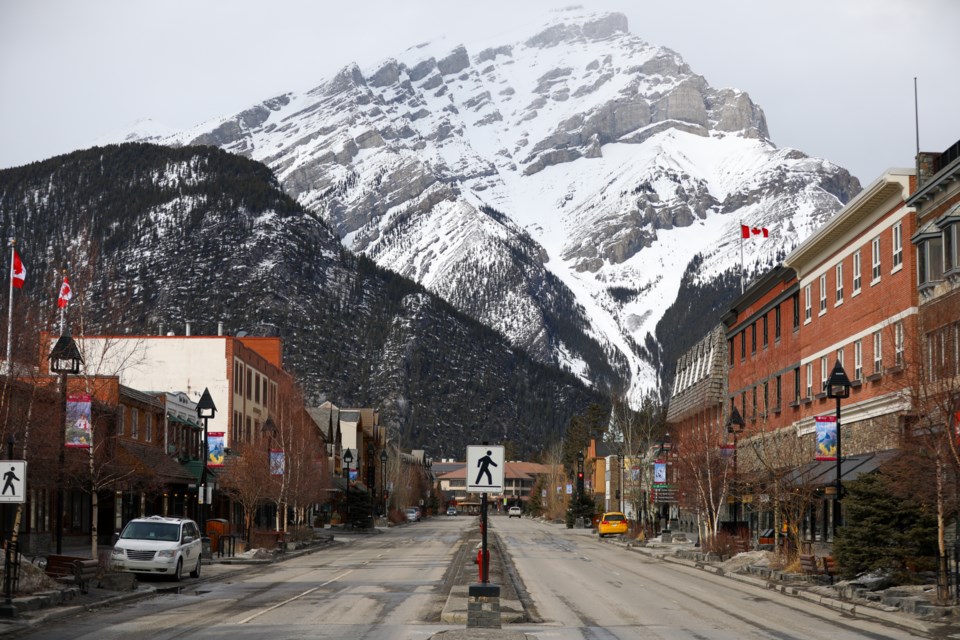BANFF – The business community is calling on Banff town council to cut budgets to reduce commercial property taxes to help Banff’s struggling businesses left devastated by the COVID-19 crisis.
Banff and Lake Louise Hospitality Association (BLLHA) has asked council to reduce commercial property taxes by 35 per cent by tapping into capital reserve funds and by cutting the municipality’s non-essential staffing levels.
Darren Reeder, the group’s executive director, said failure to respond to this economic shock by reducing property taxes will test the liquidity of most businesses and their ability to avoid permanent closure over the next four to eight weeks.
“Notable for a number of hotel properties is the fact that monthly property taxes now represent more than the combined cost of their payroll, utilities and insurance expenses,” he said, adding that an average 200-room hotel pays the Town of Banff about $500,000 in property taxes a year.
“While tax instalments have been deferred for the time being, costs like this are accruing on businesses’ books and threaten to consume all available cash flow once business operations get going again.”
For Tuesday's (April 14) council meeting, Town of Banff administration prepared a document as a starting-point for discussion, with proposed amendments that would lead to a reduction to the $20 million total municipal tax levy of $1.3 million from the current approved budget.
Based on the business community’s suggestion for tax cuts to the tune of about 35 per cent, the municipal levy would need to be reduced by more than $6 million.
Councillors bandied around ideas, including consideration of a pay decrease for Town of Banff staff based on a sliding scale and additional layoffs on top of those that have already occurred.
While most councillors indicated an unwillingness to tap into capital reserves, others were keen to look at the idea of not transferring the $4.5 million that was planned to go into the municipality’s savings account this year.
Banff also has a surplus of $1.2 million from 2019, as well as between $500,000 and $550,000 in a budget stabilization fund, that were discussed as possible ways of decreasing the tax burden to the community.
Mayor Karen Sorensen said council believes it is important to reopen the budget for 2020 given the circumstances.
“Administration has provided us some of their first thoughts on where they think we will see declines in revenue, increases in expenses because of the pandemic and where they see us being able to make financial reductions to the budget,” she said.
“I think council will have a serious look at that and probably give direction on whether they agree with the suggestions, and I believe council may have other suggestions of their own that will come up.”
Discussions on the budget resume Thursday (April 16) at a special meeting of council.
Every community in this country is facing its own unique challenges in response to the COVID-19 pandemic, but Reeder said one way that Banff is notably different is the size of the employment impacts.
“Whereas Premier Jason Kenney paints a dire picture of Alberta with unemployment levels as high as 25 per cent, there are few communities that understand the magnitude of 80 to 85 per cent unemployment, but this is the narrative for Banff,” he said.
All evidence suggests there will be very limited tourism demand in Banff this summer – with the local tourism industry generating most of its annual revenue in the months of May through October.
The Town of Banff has very few stores open, and those that are operating are providing essential services to residents. Parks Canada has shut down the national park to visitors by banning vehicle access at all trailheads and day-use areas.
“For many businesses, having to temporarily suspend operations has presented incalculable financial challenges,” said Reeder.
“As every day goes by, the risk of business failure increases exponentially as the challenge of trying to maintain overhead costs tests the liquidity of every business.”
Although BLLHA has no intention to critique the municipal budget line-by-line, Reeder said a much deeper response will be required.
“This is not a short-term economic blip we are facing,” said Reeder. “It is time to explore options to ‘right size’ the municipality’s corporate structure in a way that closer aligns with measures that have been undertaken within the private sector.”
Reeder said the community has come together to support each other without hesitation in the midst of this crisis, which has shaken the community to its core.
“BLLHA is grateful to the Town of Banff for its role in ensuring the most vulnerable in our community have had a voice, and have been provided cover – whether in the form of food, shelter, emotional supports, or otherwise,” he said.
“A community’s true character comes out during crisis and we’re proud of our shared response.”




